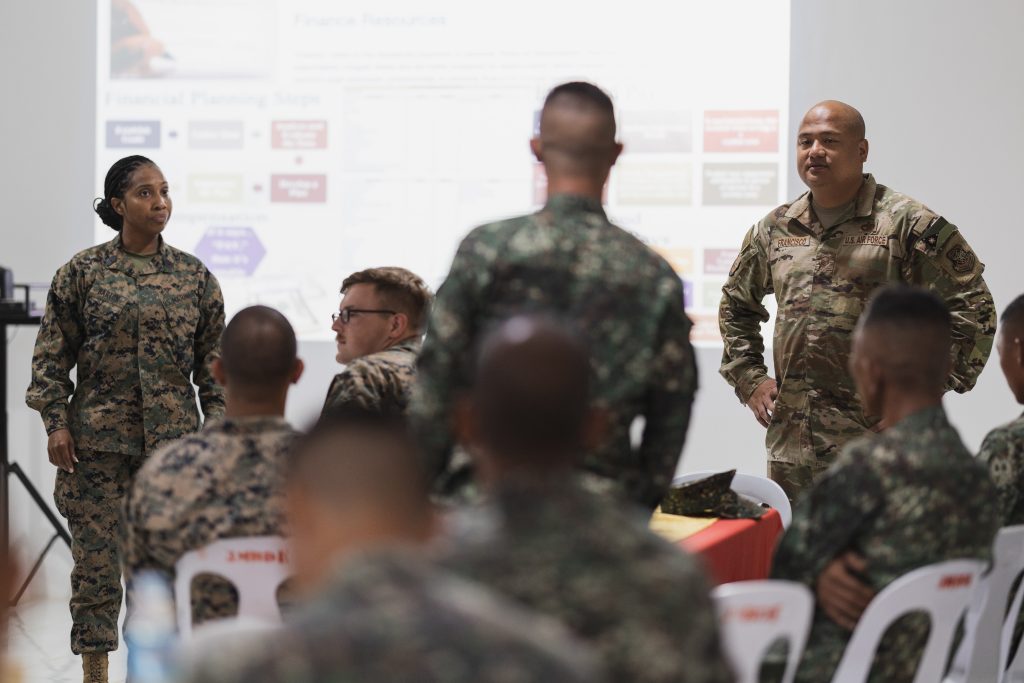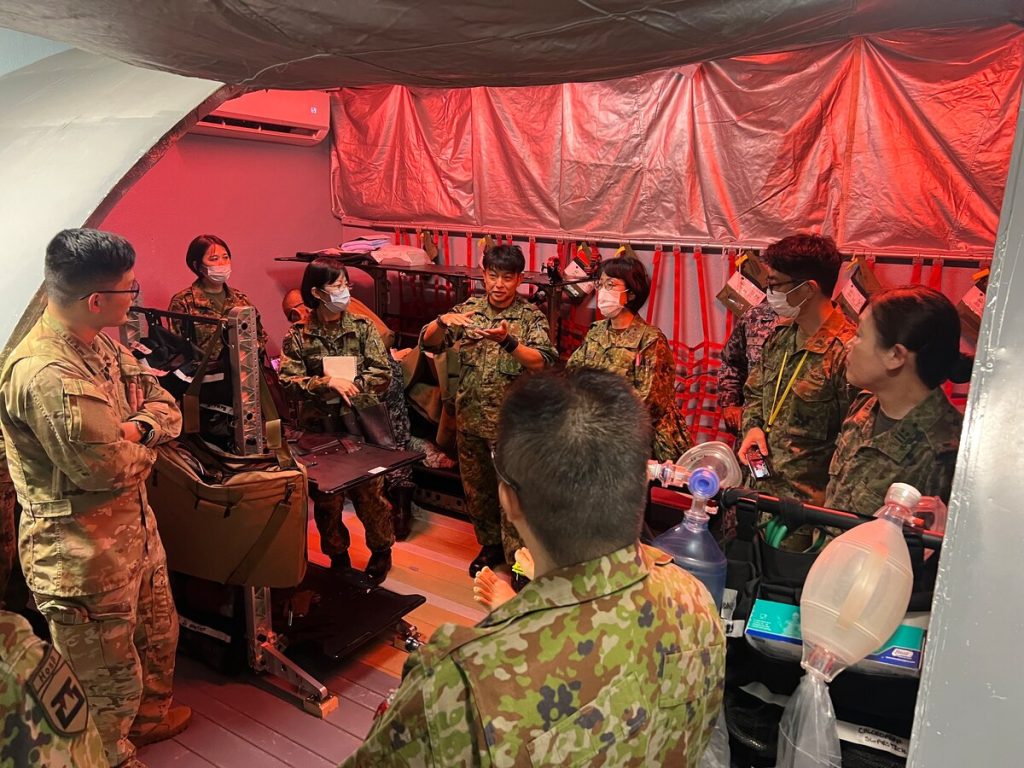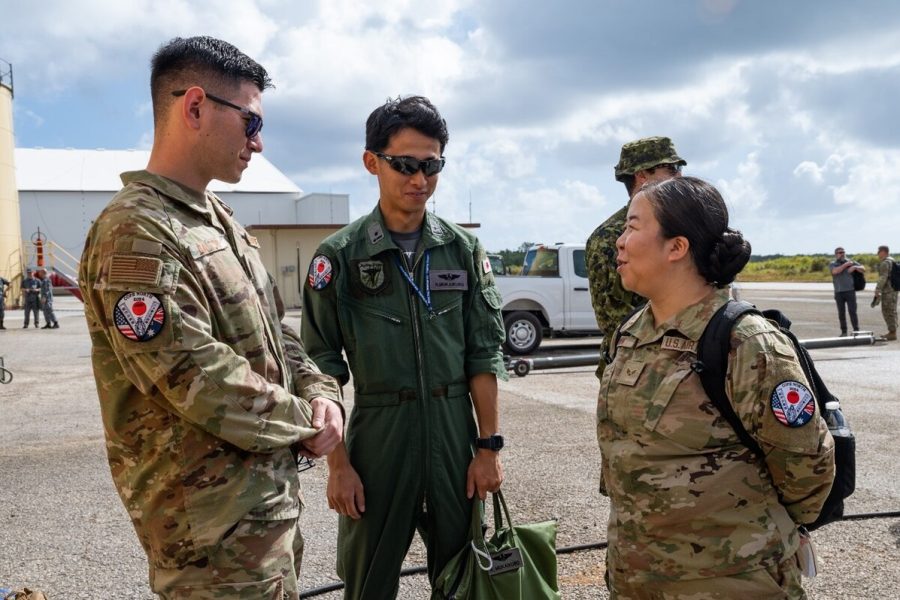Philippine Marine Corps Brig. Gen. Jimmy Larida has partnered with the U.S. Marine Corps in 34 exercises over the course of his career, but something special happened in 2022 during the large-scale exercise called Kamandag 6.
Unlike previous editions, this one featured Language-Enabled Airman Program (LEAP) scholars, a program in the Air Force Culture and Language Center (AFCLC) where Airmen and Guardians with significant experience in a foreign language can serve as cultural and linguistic experts for their fellow service members.
At Kamandag 6, LEAP scholars helped bridge the cultural gap between the American and Filipino Marines and translate military jargon so the two camps could work more closely together. Larida said the LEAP scholars “are truly one of us.”
“It has made a huge difference,” he said in an October press release. “My marines trust them, and my marines are drawn to them. This needs to happen, every single time from here on out.”

That kind of connection not only helps at a tactical exercise, it is also an essential part of the U.S. National Defense Strategy, which notes integration with partners and allies as a cornerstone of deterring near-peer rivals such as Russia and China, especially considering the vast areas of the Pacific and Europe that the U.S. cannot secure alone.
“Mathematically, I’m not sure that any of this actually works if we’re not able to work at the highest levels of integration with our partners and allies,” said AFCLC head and retired Air Force Col. Walter Ward.
The program is in high demand; there are 3,750 LEAP scholars across 101 languages, and 2,000 of those scholars are fully trained in the program while the rest are in development. About 70 percent of those 2,000 scholars have used their skills in work with allies and partners, according to AFCLC data.
“I will never do another bilateral exercise without requesting the language and cultural expertise that LEAP was able to provide,” U.S. Marine Corps Col. Thomas Siverts said after Kamandag 6.
The problem is that there are only so many LEAP scholars to go around, especially in Japanese and Ukrainian, the demand for which “has gone through the roof in the last couple of years,” Ward said. While AFCLC has new mechanisms to track demand and stretch the capability of LEAP scholars, the best long-term solution may be to accelerate LEAP’s growth.
“Do we need to get bigger and do we need to get bigger faster? Yes,” Ward said, acknowledging the Air Force has a long list of priorities to juggle. “If we have a strategy that hinges on incorporating partners and allies, at every stage of planning, campaigning and force development … I can’t see a pathway without those skills.”
Constant Conversations
Back at AFCLC headquarters at Maxwell Air Force Base, Ala., about 20 employees manage nearly 4,000 LEAP scholars around the world. The center came up with its own system for military units to request LEAP assistance and for AFCLC to fill those requests without tasking authority or owning forces. Under the training partnership request process (TPR), requesting units fill out a form online specifying the rank and language of the LEAP scholar they need and how long they need the scholar for. Then the center matches a scholar to the request.
Besides streamlining the process, the system also helps track LEAP demand: AFCLC fills a request from combatant commands every 1.19 days said Chris Chesser, chief of the center’s language division. On top of that, LEAP scholars use a self-reporting utilization tool to document how they use their language and culture skills outside of the TPR process.
“From just the past two years, LEAP scholars have self-reported utilization in 123 countries and 79 languages,” Chesser said.
But some languages have fewer scholars to meet the demand than others. There are just 241 Japanese LEAP scholars helping build a partnership with Japan, a bond that U.S. Indo-Pacific Command leaders say is crucial to security in the region. As Russia’s war in Ukraine drags on, so too does the demand for the 64 Ukrainian LEAP scholars who can help.
“There’s just no shortage of demand,” said Ward, to the extent that AFCLC is cross-training Russian speakers with some Ukrainian skills to try to swell the ranks.
The Air Force could hire more interpreters, but they may not speak aircraft maintenance, acquisition, medicine, or other military subjects the U.S. needs to work on with partners.
“Contract interpreters speak the target language and presumably English, but every LEAP scholar speaks at least three languages: English, the target language, and Air Force,” Ward said. “Your typical dinnertime conversation probably didn’t involve words like fragmentary warhead or load-bearing capacity. So even if you speak a language, it can fall apart quickly when a conversation is technical and time-compressed.”
To try to stretch the capability of existing LEAP scholars, AFCLC is developing a flight lead/wingman concept, where a trained-up LEAP scholar oversees two colleagues who took the Defense Language Proficiency Test in Ukrainian, for example, but who may not have passed through LEAP’s language and culture mentorship or immersion programs.
“Take the expert that has specialized training to others who are willing and able and have some talent,” Ward explained. “They can coach them up and make the same assets go a lot further.”

Next Steps
Interest in joining LEAP is high: every year the program gets about four applications for each one of the roughly 400 new spots it can support. Speaking in early July in the middle of the year’s application window, Ward said the program had received 20 percent more applications in 2024 than it had the year before with two weeks still left to go.
The program’s current mandate is to grow to about 4,000 LEAP scholars by 2026, but Ward said their model is highly scalable, “and we could grow that to whatever number that you want.”
In the meantime, AFCLC hopes to establish better metrics for tracking language and culture competencies across the service. Today, the system does not track those skills for Airmen and Guardians after they graduate basic military training, Ward explained.
“If we mean what we say about interoperability with partners and allies, we can’t let that talent be dormant out there,” he said. “We’ve got to find it and deliberately develop it.”
The retired colonel made a business case for LEAP: where a contract interpreter can cost more than $100 per hour on top of the logistics of moving them to the requesting unit’s location, a LEAP scholar “will recover every penny that we will ever spend on their development and then some.”
Language and culture skills, he added, “is as essential to the application of lethal effects as it is to basic partnership-building and coming to the agreements that we need to go apply them,” he said. “This is the asymmetric capability that our adversaries can’t match and can’t counter.”
